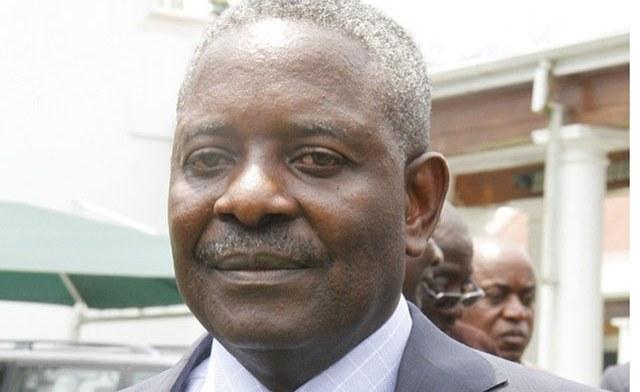News / National
Zimbabwean CIO's role in Simon Mann's arrest
04 Dec 2024 at 16:21hrs |
0 Views

Happyton Bonyongwe, Zimbabwe's former Director-General of the Central Intelligence Organisation (CIO), has disclosed details about Zimbabwe's involvement in thwarting a 2004 mercenary-led coup attempt in Equatorial Guinea. The revelations come from his newly published memoir, One Among Many: My Contribution to the Zimbabwean Story.
Simon Mann, a former British Special Air Services (SAS) officer, was arrested alongside 64 mercenaries, primarily South African nationals, on March 7, 2004, at Harare's Manyame Airbase. The group was en route to Equatorial Guinea to overthrow President Teodoro Obiang Nguema Mbasogo. They had stopped in Zimbabwe to procure weapons from the state-owned Zimbabwe Defence Industries (ZDI).
Bonyongwe details how the CIO, working in coordination with Zimbabwean Military Intelligence and South Africa's State Security Agency (SSA), meticulously monitored Mann's activities. The intelligence collaboration uncovered that Mann and his associates intended to replace Obiang with Severo Moto, an exiled opposition leader based in Spain.
In January 2004, Zimbabwean authorities received intelligence about a plane that would collect weapons from Harare. While the initial flight failed due to technical issues in Zambia, further investigations revealed Mann's intent to use Zimbabwe as a supply base. In February 2004, Bonyongwe personally met with South Africa's intelligence chief to coordinate efforts to thwart the operation, aligning with the African Union's stance against coups.
By March, Mann had paid $200,000 for the weapons, highlighting his commitment to the coup attempt. On March 7, Mann's plane, which had transported 64 mercenaries from South Africa's Polokwane airport, landed in Harare. The entire crew, along with Mann and his associates, was arrested.
The operation implicated several international actors, including financiers such as Mark Thatcher (son of former British Prime Minister Margaret Thatcher), who was later fined and sentenced in South Africa. Allegations also surfaced that the U.S., UK, and Spain were aware of the coup but chose not to intervene, though all denied involvement.
Mann was extradited to Equatorial Guinea after serving part of his sentence in Zimbabwe. There, he received a pardon and later served as a security adviser to President Obiang. The foiled coup elevated Zimbabwe's standing as a defender of African sovereignty and pan-African ideals.
Bonyongwe underscores how the operation reinforced Zimbabwe's commitment to resisting foreign interference. Despite economic challenges and strained diplomatic ties, the mission showcased the capabilities of Zimbabwe's security apparatus in preserving continental stability.
The failed coup also had lasting repercussions for Equatorial Guinea, prompting significant infrastructure investments funded by its oil revenues. President Obiang strengthened his influence in the African Union and hosted major events such as the African Cup of Nations.
Bonyongwe's account offers a rare glimpse into the high-stakes world of international espionage and the complexities of defending African sovereignty amid global power dynamics.
Simon Mann, a former British Special Air Services (SAS) officer, was arrested alongside 64 mercenaries, primarily South African nationals, on March 7, 2004, at Harare's Manyame Airbase. The group was en route to Equatorial Guinea to overthrow President Teodoro Obiang Nguema Mbasogo. They had stopped in Zimbabwe to procure weapons from the state-owned Zimbabwe Defence Industries (ZDI).
Bonyongwe details how the CIO, working in coordination with Zimbabwean Military Intelligence and South Africa's State Security Agency (SSA), meticulously monitored Mann's activities. The intelligence collaboration uncovered that Mann and his associates intended to replace Obiang with Severo Moto, an exiled opposition leader based in Spain.
In January 2004, Zimbabwean authorities received intelligence about a plane that would collect weapons from Harare. While the initial flight failed due to technical issues in Zambia, further investigations revealed Mann's intent to use Zimbabwe as a supply base. In February 2004, Bonyongwe personally met with South Africa's intelligence chief to coordinate efforts to thwart the operation, aligning with the African Union's stance against coups.
By March, Mann had paid $200,000 for the weapons, highlighting his commitment to the coup attempt. On March 7, Mann's plane, which had transported 64 mercenaries from South Africa's Polokwane airport, landed in Harare. The entire crew, along with Mann and his associates, was arrested.
The operation implicated several international actors, including financiers such as Mark Thatcher (son of former British Prime Minister Margaret Thatcher), who was later fined and sentenced in South Africa. Allegations also surfaced that the U.S., UK, and Spain were aware of the coup but chose not to intervene, though all denied involvement.
Mann was extradited to Equatorial Guinea after serving part of his sentence in Zimbabwe. There, he received a pardon and later served as a security adviser to President Obiang. The foiled coup elevated Zimbabwe's standing as a defender of African sovereignty and pan-African ideals.
Bonyongwe underscores how the operation reinforced Zimbabwe's commitment to resisting foreign interference. Despite economic challenges and strained diplomatic ties, the mission showcased the capabilities of Zimbabwe's security apparatus in preserving continental stability.
The failed coup also had lasting repercussions for Equatorial Guinea, prompting significant infrastructure investments funded by its oil revenues. President Obiang strengthened his influence in the African Union and hosted major events such as the African Cup of Nations.
Bonyongwe's account offers a rare glimpse into the high-stakes world of international espionage and the complexities of defending African sovereignty amid global power dynamics.
Source - online
Join the discussion
Loading comments…
























